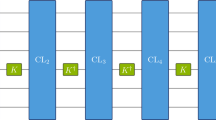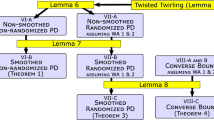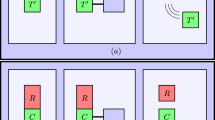Abstract
Decoupling has become a central concept in quantum information theory, with applications including proving coding theorems, randomness extraction and the study of conditions for reaching thermal equilibrium. However, our understanding of the dynamics that lead to decoupling is limited. In fact, the only families of transformations that are known to lead to decoupling are (approximate) unitary two-designs, i.e., measures over the unitary group that behave like the Haar measure as far as the first two moments are concerned. Such families include for example random quantum circuits with O(n 2) gates, where n is the number of qubits in the system under consideration. In fact, all known constructions of decoupling circuits use Ω(n 2) gates. Here, we prove that random quantum circuits with O(n log2 n) gates satisfy an essentially optimal decoupling theorem. In addition, these circuits can be implemented in depth O(log3 n). This proves that decoupling can happen in a time that scales polylogarithmically in the number of particles in the system, provided all the particles are allowed to interact. Our proof does not proceed by showing that such circuits are approximate two-designs in the usual sense, but rather we directly analyze the decoupling property.
Similar content being viewed by others
References
Abeyesinghe A., Devetak I., Hayden P., Winter A.: The mother of all protocols: Restructuring quantum information’s family tree. Proc. Roy. Soc. A Math. Phys. 465, 2537 (2009) arXiv:quant-ph/0606225
Berta, M.: Single-shot quantum state merging (2009). arXiv:0912.4495
Brown, W., Fawzi, O.: Short random circuits define good quantum error correcting codes. In: Proc. IEEE ISIT, pp. 346–350 (2013). arXiv:1312.7646
Berta, M., Fawzi, O., Wehner, S.: Quantum to classical randomness extractors. In: Proc. CRYPTO, LNCS, vol. 7417, pp. 776–793 (2012). arXiv:1111.2026
Bhatia R.: Matrix Analysis. Springer, Berlin (1997)
Brandao, F.G.S.L, Harrow, A.W., Horodecki, M.: Local random quantum circuits are approximate polynomial-designs (2012). arXiv:1208.0692
Brown, W., Poulin, D.: Approximate designs need not scramble (2015, in preparation)
Brown W.G., Viola L.: Convergence rates for arbitrary statistical moments of random quantum circuits. Phys. Rev. Lett. 104, 250501 (2010) arXiv:0910.0913
Cleve, R., Leung, D., Liu, L., Wang, C.: Near-linear constructions of exact unitary 2-designs (2015). arXiv:1501.04592
Dupuis F., Berta M., Wullschleger J., Renner R.: One-shot decoupling. Commun. Math. Phys. 328(1), 251–284 (2014) arXiv:1012.6044
Dankert C., Cleve R., Emerson J., Livine E.: Exact and approximate unitary 2-designs and their application to fidelity estimation. Phys. Rev. A 80(1), 12304 (2009) arXiv:quant-ph/0606161
Dupuis F., Fawzi O., Wehner S.: Entanglement sampling and applications. IEEE Trans. Inform. Theory 61(2), 1093–1112 (2015) arXiv:1305.1316
del Rio L., Åberg J., Renner R., Dahlsten O., Vedral V.: The thermodynamic meaning of negative entropy. Nature 474(7349), 61–63 (2011)
del Rio, L., Hutter, A., Renner, R., Wehner, S.: Relative thermalization (2014). arXiv:1401.7997
Dupuis, F.: The decoupling approach to quantum information theory. PhD thesis, Université de Montreal (2010). arXiv:1004.1641
Emerson J., Livine E., Lloyd S.: Convergence conditions for random quantum circuits. Phys. Rev. A 72(6), 060302 (2005) arXiv:quant-ph/0503210
Emerson J., Weinstein Y.S., Saraceno M., Lloyd S., Cory D.G.: Pseudo-random unitary operators for quantum information processing. Science 302(5653), 2098–2100 (2003)
Harrow A., Low R.: Random quantum circuits are approximate 2-designs. Commun. Math. Phys. 291, 257–302 (2009) arXiv:0802.1919
Hayden P., Leung D.W., Winter A.: Aspects of generic entanglement. Commun. Math. Phys. 265(1), 95–117 (2006) arXiv:quant-ph/0407049
Horodecki M., Oppenheim J., Winter A.: Partial quantum information. Nature 436, 673–676 (2005) arXiv:quant-ph/0505062
Horodecki M., Oppenheim J., Winter A.: Quantum state merging and negative information. Commun. Math. Phys. 269, 107 (2006) arXiv:quant-ph/0512247
Hayden, P., Preskill, J.: Black holes as mirrors: quantum information in random subsystems. J. High Energy Phys., 120 (2007). arXiv:0708.4025
Hamma A., Santra S., Zanardi P.: Quantum entanglement in random physical states. Phys. Rev. Lett. 109, 040502 (2012) arXiv:1109.4391
Hutter, A.: Understanding Equipartition and Thermalization from Decoupling. http://www.quantumlah.org/media/thesis/NCQT_AdrianHutter_MSc2011.pdf (2011)
Hutter A., Wehner S.: Dependence of a quantum-mechanical system on its own initial state and the initial state of the environment it interacts with. Phys. Rev. A 87, 012121 (2013) arXiv:1111.3080
Low, R.A.: Pseudo-randomness and learning in quantum computation. PhD thesis, Bristol (2010). arXiv:1006.5227
Lloyd S., Preskill J.: Unitarity of black hole evaporation in final-state projection models. J. High Energy Phys. 08, 126 (2014)
Lashkari N., Stanford D., Hastings M., Osborne T., Hayden P.: Towards the fast scrambling conjecture. J. High Energy Phys. 2013(4), 1–33 2013 (2013) arXiv:1111.6580
Mitzenmacher M., Upfal E.: Probability and Computing: Randomized Algorithms and Probabilistic Analysis. Cambridge University Press, Cambridge (2005)
Oliveira R., Dahlsten O.C.O., Plenio M.B.: Generic entanglement can be generated efficiently. Phys. Rev. Lett. 98(13), 130502 (2007) arXiv:quant-ph/0605126
Renes J., Dupuis F., Renner R.: Efficient polar coding of quantum information. Phys. Rev. Lett. 109, 050504 (2012) arXiv:1109.3195
Szehr O., Dupuis F., Tomamichel M., Renner R.: Decoupling with unitary approximate two-designs. New J. Phys. 15(5), 053022 (2013) arXiv:1109.4348
Sutter, D., Renes, J., Dupuis, F., Renner, R.: Efficient quantum channel coding scheme requiring no preshared entanglement. In: Proc. IEEE ISIT (2013)
Sekino Y., Susskind L.: Fast scramblers. J. High Energy Phys. 2008(10), 065 (2008) arXiv:0808.2096
Toacute;th G., García-Ripoll J.J.: Efficient algorithm for multiqudit twirling for ensemble quantum computation. Phys. Rev. A 75(4), 042311 (2007) arXiv:quant-ph/0609052
Vadhan, S.: Pseudorandomness. Found. Trends Theor. Comput. Sci. 7(13), 1–336 (2011). http://people.seas.harvard.edu/salil/pseudorandomness/
Wilde, M., Renes, J.: Quantum polar codes for arbitrary channels. In: Proc. IEEE ISIT, pp. 334–338 (2012)
Žnidarič M.: Exact convergence times for generation of random bipartite entanglement. Phys. Rev. A 78(3), 032324 (2008) arXiv:0809.0554
Author information
Authors and Affiliations
Corresponding author
Additional information
Communicated by A. Winter
Rights and permissions
About this article
Cite this article
Brown, W., Fawzi, O. Decoupling with Random Quantum Circuits. Commun. Math. Phys. 340, 867–900 (2015). https://doi.org/10.1007/s00220-015-2470-1
Received:
Accepted:
Published:
Issue Date:
DOI: https://doi.org/10.1007/s00220-015-2470-1




